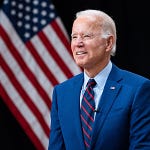President Biden criticized the Arizona Supreme Court's decision to uphold a 19th-century abortion ban, highlighting its severe implications for women in Arizona, particularly in cases of health risks, rape, or incest. He characterized the 1864 ban, enacted before Arizona's statehood and women's suffrage, as a product of an extreme Republican agenda aimed at undermining women's freedoms.
President Biden and Vice President Harris reaffirmed their support for reproductive rights, aligning themselves with the majority of Americans who favor a woman's right to choose. They urged Congress to enact legislation that would reinstate the protections previously afforded by Roe v. Wade across all states.
During Care Workers Recognition Month, the Biden-Harris Administration emphasized its commitment to enhancing the U.S. care system, highlighting achievements and future plans to improve the affordability, quality, and accessibility of care. President Biden announced further investments in child care, home care, and paid family and medical leave, funded by increased taxes on the wealthy and corporations, contrasting sharply with Republican proposals for significant cuts to care funding to finance tax cuts for the wealthy. The administration has focused on reducing child and long-term care costs and supporting care workers and family caregivers. It has initiated several measures to bolster the care sector, including the American Rescue Plan and executive orders. This approach, emphasizing middle-out and bottom-up economic growth, opposes Republican priorities of tax reductions for high-income individuals and corporations at the expense of care and social services.
In Washington, D.C., President Biden highlighted the care economy's importance, sharing his connection to caregiving challenges and emphasizing the value of care workers. He outlined his administration's achievements and future plans to improve affordability and support for childcare, home care, and paid leave while advocating for fair taxation to fund these initiatives. The President criticized Republican proposals for cutting caregiving programs and healthcare reforms, underscoring the choice between investing in American families or favoring the wealthiest. He concluded with a message of optimism and unity, calling caregivers heroes and stressing the potential of collective action to address these issues.
The White House released a fact sheet that discussed The Republican Study Committee (RSC) budget. This proposal, supported by a significant portion of House Republicans, proposes deep cuts in job training and workforce development. In contrast, President Biden's approach focuses on inclusive economic growth, aiming to provide equitable access to high-quality training and education. The RSC budget plans to reduce funding for critical family and community investments by over 30%, affecting vocational training and career services for hundreds of thousands. It also seeks to dismantle the National Labor Relations Board and reduce the funding of the Occupational Safety and Health Administration. Concurrently, the RSC aims for $5.5 trillion in tax cuts benefitting the wealthy and corporations. At the same time, President Biden advocates for making corporations pay their fair share and investing in the middle class. The proposed cuts could deny over 900,000 people across various states and territories access to vital Department of Labor job training and employment services, with an assumed 31% reduction in non-defense discretionary accounts from FY 2024 levels.
The Fraud Prevention and Recovery Act, introduced by Senators Peters, Durbin, and Wyden, aligns with President Biden's proposals to combat pandemic fraud and support identity theft victims. Amid the COVID-19 crisis, rampant fraud exploited outdated government systems and suspended fraud controls, draining resources meant for struggling families and businesses. This legislation aims to fortify law enforcement with $300 million to prosecute fraudsters, extend the statute of limitations for unemployment insurance fraud to 10 years, and enhance fraud prevention efforts with a significant investment in The Treasury’s Do Not Pay Service and a new identity validation system. Additionally, it allocates funds to improve support for identity theft victims, including enhancing IdentityTheft.gov and introducing an early warning system. This comprehensive approach aims to address past vulnerabilities, prosecutes wrongdoers, and protects Americans from future fraud and identity theft.
President Biden has announced the extension of the national emergency regarding the harmful foreign activities of the Russian Government for another year beyond April 15, 2024. This decision continues the measures initiated on April 15, 2021, under Executive Order 14024 due to the significant threat these activities pose to U.S. national security, foreign policy, and economy. The scope of this emergency was expanded on March 8, 2022, through Executive Order 14066, with further steps taken in subsequent Executive Orders to address issues such as election interference, cyber-enabled activities, corruption, extraterritorial targeting of dissidents and journalists, security undermining in critical regions, and violations of international law, including territorial integrity. This continuation aligns with the National Emergencies Act, ensuring the U.S. government can respond effectively to these ongoing threats.
President Biden has also extended the national emergency concerning Somalia, initially declared on April 12, 2010, due to threats to U.S. national security and foreign policy. This extension, beyond April 12, 2024, addresses the ongoing security deterioration and violence in Somalia, including acts of piracy, armed robbery at sea, and violations of a UN arms embargo. The continuation is also in response to revenue-generating exports of charcoal by Islamist militant group al-Shabaab, misappropriation of Somali assets, and violence against civilians. The national emergency and measures from the original and a subsequent executive order on July 20, 2012, aim to counter these threats. This decision was announced in a notice to be published in the Federal Register and transmitted to Congress by The President.
Vice President Kamala Harris met with families of Americans taken hostage by Hamas on October 7, emphasizing the Biden administration's top priority of reuniting these hostages with their loved ones. She assured the U.S. commitment to retrieving the remains of deceased hostages, condemned Hamas's actions as those of a brutal terrorist organization, and criticized its use of sexual violence.
The Vice President reiterated the importance of addressing the threat Hamas poses to Israel and the need to combat the rise of antisemitism globally and expressed solidarity and ongoing support for the affected families. She also provided updates on U.S. efforts to secure the hostages' release and achieve an immediate ceasefire in Gaza, highlighting the administration's dedicated focus on resolving this crisis.
National Economic Advisor Lael Brainard stated that the high volume of stock buybacks by large corporations resulted from the tax cuts implemented during the Trump administration. President Biden's stock buyback tax aims to redirect corporate investment towards workers and the U.S. economy, away from wealthy investors, ensuring corporations contribute more equitably. The Treasury Department's proposed regulations are highlighted as a significant move towards realizing President Biden's tax fairness objectives.
The White House issued a fact sheet highlighting the Biden-Harris Administration's efforts to improve access and the delivery of safety net benefits, such as the Supplemental Nutrition Assistance Program (SNAP), Medicaid, the Special Supplemental Nutrition Program for Women, Infants, and Children (WIC), and child care support. Following the President’s Executive Order on Customer Experience, the administration aims to make these essential services more accessible and efficient, emphasizing the need for families to find, apply, and remain enrolled in these programs easily, without unnecessary repetition of information or bureaucratic obstacles.
Efforts include simplifying application processes, reducing administrative red tape, and improving inter-program data sharing to ease the burden on families and state agencies. Key initiatives involve Medicaid and CHIP coverage optimization, streamlined childcare subsidies, and pilot programs for better income verification. The administration also encourages states to adopt practices that facilitate easier access to benefits, such as flexible SNAP requirements and data sharing for eligibility verification to improve service quality and efficiency for beneficiaries.












Share this post